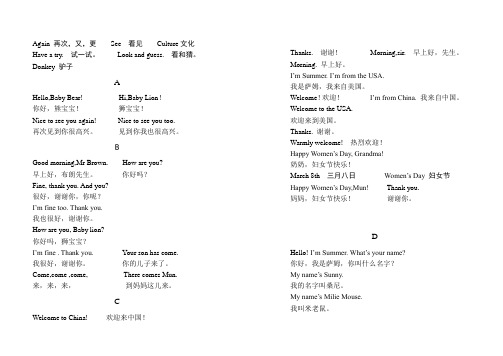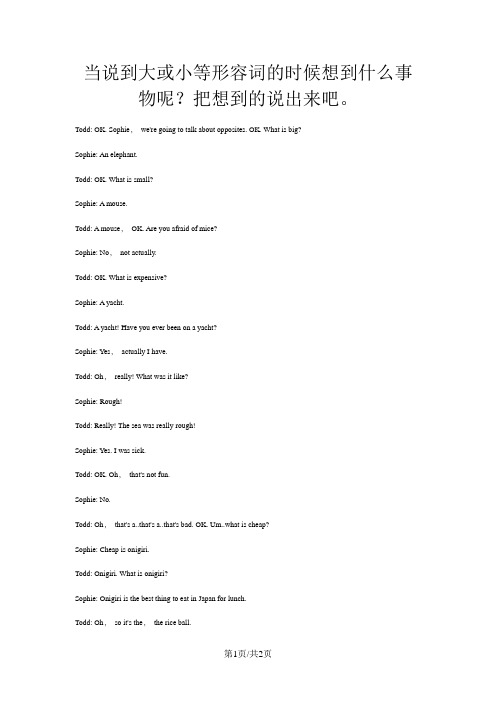2019精选教育原版英语口语情景对话第0073集:反义词大讨论.doc
小学英语口语俩俩对话及课堂用语

英语口语俩俩对话(English Dialogues In Pairs)1. A: What’s your name? 你的名字是什么?B: My name is Li Ming. 我的名字是李明。
2. A: How old are you? 你几岁了?B: I’m nineteen years old. 我19岁。
3. A: How are you? 你好吗?B: Fine, thanks. And you? 很好,谢谢.你呢?A: I’ m fine,too. 我也很好。
4. A: This is Jenny. She is my friend. 这是Jenny.她是我的朋友A: Jenny, This is John. Jenny,这是John。
B: Nice to meet you. 很高兴见到你。
C: Nice to meet you, too. 我也是.5. A: Who is on duty today? 今天谁值日?B: I am on duty today. 今天我值日。
6. A: Is everyone here? 人都在吗?B: Yes, we are./NO, Lily is’t here. 是,都来了。
/不,Lily没来。
7. A: What day is it today? 今天是星期几?B: It’s Monday. 星期一。
8. A: What date is it today? 今天几号?B: It’s April 12th today. 今天四月十二号。
9. A: What’s the weather like today? 今天天气怎么样?B: It is cold. 天气很冷。
10. A: Can I help you? 我能帮你吗?B:Yes, please./No, thanks. 好的。
/不,谢谢。
11. A: May I borrow your pencil, please? 请问我能借你的铅笔吗?B: Sure! Here you are. 当然可以! 给你。
英语情景对话句子学习

Tom: I have never experienced a roller coaster. I want you to sit beside me.
汤姆:我从来都没有坐过云霄飞车,我想你陪我一起玩。
Bill:Wait a moment, I want to go to the toilet.
知识点津
break it up表示“别打架了,别吵架了”,看到有人在打架,这句话就可以派上用场了。注意:一旦去掉了it, break up的意思就发生了改变,其含义为”砸碎,解散”,使用时要注意区分。
经典语句
You 're on your last leg!你快要崩溃了!
比尔:不会吧。我听说他很爱指使人。
知识点津
在这个句子中,boss是动词,意为“指挥,对……发号施令”,boss around就是“被差来差去”的意思,这种滋味可不好受。如果再碰到这种情况,你要对他说:Don’t try to boss me around.别企图把我呼来喝去的。
我们通过例子来领会go by the numbers这个习惯用语的意思。这是一位领导在指示手下一名工作人员如何改写一份工作报告。
他觉得John最好把报告重写一遍。他喜欢John的那些想法,只是不喜欢报告的结构布局。他建议John这回按照标准形式来写。
换句话说,就是要John循规蹈矩地写这篇报告。显然习惯用语go by the numbers意思是按照一定的形式,也就是循规蹈矩。
经典语句
Don’t chicken out!别做胆小鬼!
本杰明:由于金融危机的影响,我们公司可能要裁员,我希望我能留下来。
Shirley: Ah, we are in the same boat. The list of staff cuts will be announced tomorrow. I am worried about it.
(完整word版)常见英语反义词

(完整word版)常见英语反义词常见英语反义词above 在......上-- below 在......下after 在......后-- before 在......前all 全部-- none 全无answer 回答-- ask 询问answer 答案-- question 问题back 后面-- front 前面bad 坏的-- good 好的best 最好的-- worst 最坏的better 更好的-- worse 更坏的black 黑的-- white 白的both 两者都-- neither 两者都不busy 忙碌的-- free 空闲的buy 买(入)-- sell 卖(出)cheap 便宜的-- expensive, dear 昂贵的clean 干净的-- dirty 肮脏的clever 聪明的-- foolish 愚蠢的cold 寒冷的-- hot 炎热的come 来-- go 去cool 凉爽的-- warm 温暖的danger 危险-- safety 安全dark 黑暗的-- bright, light 明亮的day 白天-- night 夜晚die 死去-- live 活着down 向下-- up 向上dry 干燥的-- wet 潮湿的early 早的-- late 迟的easy 容易的-- difficult, hard 困难的;艰巨的empty 空的-- full满的entrance 入口-- exit 出口fall 落下-- rise 升起far 远的-- near 近的finish 结束-- begin, start 开始first 最初的-- last 最后的foreign 外国的-- home 本国的forget 忘记-- remember 记得glad 愉快的-- sad, sorry 悲伤的;难过的happy 高兴的-- unhappy, sad 难过的hard 硬的-- soft 软的hate 憎恨-- love, like 热爱;喜欢here 在这里-- there 在那里high 高的-- low 低的ill 生病的-- healthy, well 健康的into 到......里面-- out of 从......到外,在......之外inside 在里面-- outside 在外面light 轻的-- heavy 重的lose 丢失-- find 找到lose 失败-- win 胜利;赢得miss 未抓住;未赶上-- catch 抓住;赶上most 最多的-- least, fewest 最少的move 移动-- stop 停止never 从不-- ever 曾经nothing 什么也没有-- everything一切now 现在-- then 那时old 旧的-- new 新的old 年老的-- young 年轻的pain 痛苦-- pleasure 快乐pass 通过;及格-- fail 未通过;不及格poor 贫穷的-- rich 富裕的pull 拉-- push 推rainy 下雨的-- dry 干旱的right 右边(的)-- left 左边(的)right 正确的-- wrong 错误的safe 安全的-- dangerous 危险的same 相同的-- different 不同的short 短的-- long 长的short (个子)矮的-- tall (个子)高的sleep 睡觉-- wake 醒来small 小的-- big, large, great 大的start 出发-- reach 到达strong 强壮的-- weak 虚弱的take 拿走-- bring 带来take 拿取-- give 给予teach 教(课)-- learn 学习thin 瘦的-- fat 胖的thin 薄的-- thick 厚的town 城镇-- country 乡下whole 全体;全部-- part 部分wide 宽的-- narrow 窄的with 有-- without 没有yes 是的-- no 不是的近义词toilet —WC listen —hear class —lesson everyone —everybody glass —cup large —bigglad —happy like —love little —small photo —picture purse—wallet start —begin home—house learn—study beautiful—pretty usually —often look —see cycle —bike near —beside hi —hello quick —fast garden —park desk —table speak —say —talk river —lake go home —come homea moment ago— just now a lot of —lots of — many be goodat —do well in of course —surebe from —come from take a walk —go for a walk take a bus —by bus would like —want look for— find 同音词B—bee—be no—knowC—see—sea hi—highI—eye for—fourR—are son—sunT—tea our—hourU—you pair—pearY—why here—hearto—two—too there—theirby—bye—buy right—writered—read(过) aren’t—auntnew—knew(过) father—fartherblue—blew(过) who’s—whose反义词big—small black—white fat— thinlate —early long —short tall— shortbad —good cold —hot yes— nohere —there far —near come— goopen —close sit —stand cry —laughright —wrong right— left same —differentquick— slow new —old young— oldask —answer busy —free day — nightup —down词形转换1. here(反义词)there2. ask(反义词)answer3. dry(反义词)wet4. cold (反义词)hot5. near (反义词)far6. late(反义词)early7. right (反义词)wrong8. quick (反义词)slow9. light(反义词)heavy 10.above(反义词)below 11.take off (反义词)put on 12.cheap(反义词)expensive13.remember(反义词)forget 14.strong (反义词)weak15.win(反义词)lose 16.have(三单)has17.carry(三单)carries 18.say(三单)says19.zero (复数) zeros 20.knife (复数) knives21.this (复数) these 22.leaf (复数) leaves23.beach(复数) beaches 24.ring(现代分词)ringing25.sit(现代分词)sitting 26.swim(现代分词)swimming27.run (现代分词)running 28.call (现代分词)calling29.lie(现代分词)lying 30.quick (副词)quickly31.slow(副词) slowy 32.easy (副词)easily33.happy(副词) happily 34.hear(同音词)here35.no (同音词)know 36.snow (形容词)snowy37.rain (形容词)rainy 38.sun(形容词)sunny39.wind (形容词)windy 40.cloud (形容词)cloudy41.one(序数词)first英语五种基本句型基本句型一: 主+系+表此句型的句子有一个共同的特点:句子谓语动词都不能表达一个完整的意思,必须加上一个表明主语身份或状态的表语构成复合谓语,才能表达完整的意思.这类动词叫做连系动词.系动词分两类:be, look, keep, seem等属一类,表示情况;get, grow, become, turn等属另一类,表示变化.be 本身没有什么意义,只起连系主语和表语的作用.其它系动词仍保持其部分词义.1. This │is │an English-Chinese dictionary. 这是本英汉辞典.2. The dinner │smells │good. 午餐的气味很好.3. His face │turned │red. 他的脸红了4. Everything │looks │different. 一切看来都不同了.5. He │is growing │tall and strong. 他长得又高又壮.基本句型二: 主+谓(不及物动词)此句型的句子有一个共同特点,即句子的谓语动词都能表达完整的意思.这类动词叫做不及物动词,后面可以跟副词,介词短语,状语从句等.1. The sun │was shining. 太阳在照耀着.2. The moon │rose. 月亮升起了.3. What he said │does not matter. 他所讲的没有什么关系.4. They │talked for half an hour. 他们谈了半个小时.5. The pen │writes smoothly. 这支笔书写流利.基本句型三: 主+谓(及物)+宾此句型句子的共同特点是:谓语动词都具有实义,都是主语产生的动作,但不能表达完整的意思,必须跟有一个宾语,即动作的承受者,才能使意思完整.这类动词叫做及物动词.1. Who │knows │the answer?谁知道答案?2. He │enjoys │reading. 他喜欢看书.3. He │admits │t hat he was mistaken. 他承认犯了错误.基本句型四: 主+谓(及物)+双宾(间宾+直宾)此句型的句子有一个共同特点:谓语动词必须跟有两个宾语才能表达完整的意思.这两个宾语一个是动作的直接承受者,另一个是动作的间接承受者.通常这一间接承受者用一个介词来连接,当动作的间接承受者在动作的直接承受者之前时,这一介词往往被省略.1. She │ordered │herself │a new dress. 她给自己定了一套新衣裳.2. I │showed │him │my pictures. 我给他看我的照片.3. He │bought │you │a dictionary.他给你买了一本字典.4. I │told │him │that the bus was late. 我告诉他汽车晚点了.5. He │showed │me │how to run the machine. 他教我开机器.基本句型五: 主+谓(及物)+复合宾语(宾+宾补)此句型的句子的共同特点是:动词虽然是及物动词,但是只跟一个宾语还不能表达完整的意思,必须加上一个补充成分来补足宾语,才能使意思完整.1. They │painted │the door │green. 他们把门漆成绿色.2. They │found │the house │deserted. 他们发现那房子无人居住.3. What │makes │him │think so?他怎么会这样想?.4. We │saw │him │out. 我们送他出去.5. He │asked │me │to come back soon. 他要我早点回来.6. I │saw │them │getting on the bus at that t ime. 我看见他们当时在上了那辆公共汽车.PEP小学英语重点句型语法总结与分析三年级起点的人教版PEP教材在小学阶段共有8册书,其涉及的重要语法知识主要有7种:to be句型、there be句型、一般现在时句型、现在进行时句型、一般过去时句型、情态动词can引导的句型、be going to句型等。
三年级下册英语对话

Again 再次,又,更See 看见Culture文化Have a try. 试一试。
Look and guess. 看和猜。
Donkey 驴子AHello,Baby Bear! Hi,Baby Lion!你好,熊宝宝!狮宝宝!Nice to see you again! Nice to see you too.再次见到你很高兴。
见到你我也很高兴。
BGood morning,Mr Brown. How are you?早上好,布朗先生。
你好吗?Fine, thank you. And you?很好,谢谢你,你呢?I’m fine too. Thank you.我也很好,谢谢你。
How are you, Baby lion?你好吗,狮宝宝?I’m fine . Thank you.Your son has come.我很好,谢谢你。
你的儿子来了。
Come,come ,come, There comes Mun.来,来,来,到妈妈这儿来。
CWelcome to China! 欢迎来中国!Thanks. 谢谢!Morning,sir. 早上好,先生。
Morning. 早上好。
I’m Summer. I’m from the USA.我是萨姆,我来自美国。
Welcome!欢迎!I’m from China. 我来自中国。
Welcome to the USA.欢迎来到美国。
Thanks. 谢谢。
Warmly welcome! 热烈欢迎!Happy Women’s Day, Grandma!奶奶,妇女节快乐!March 8th 三月八日Women’s Day 妇女节Happy Women’s Day,Mun!Thank you.妈妈,妇女节快乐!谢谢你。
DHello! I’m Summer. What’s your name?你好,我是萨姆,你叫什么名字?My name’s Sunny.我的名字叫桑尼。
My name’s Milie Mouse.我叫米老鼠。
2019六级口语考试练对话记单词(3)

B : Good , so he will be fit for work tomorrow.2019 六级口语考试练对话记单词 (3)By the way , I broke the radio aerial last night. I was wondering why the reception was so bad. aeriala. 1. 飞机的,航空的,由飞机实行的 ;2. 空中俯瞰的,架空的n. 天线A : Do you like Monet 's work?B : No, I prefer Degas, He appeals more to my aesthetic sense.aesthetic见 esthetic 来源:考试大的美女编辑们A : I am going on a study exchange to France next year.B : Oh, that 's right, your university is affiliated to one in Paris.adverse a. 不利的,有害的 A :B :vt. 使隶属 ( 或附属)于n. 附属机构,分公司B : Good , so he will be fit for work tomorrow.affiliateSimon affirmed that he was in good health.A :affirm vt.1. 断言,坚持声称;2. 证实,确认A:I could never afflict harm upon anothercreature.B:Does that mean that you are also avegetarian?afflict vt. 使苦恼,折磨A:You live in a very affluent area of thecity.B:I am lucky, but I am not weathy.affluentA:I love being in thunderstorms.B:I must say that I prefer the aftermath.aftermathA:My little sister aggravate my daily!B:But aren 't you glad that you have a little sister?aggravate vt. 1. 加重;2. 激怒,使恼火A:Life is of aggregate all past experience.B:Indeed, so I better try to gain as much experience as possible.aggregate n. 总数,合计a. 总计的,合计in the aggregate 总共,作为总体A:Stop agitate your brother!B:He is the one that started it .agitate vi. (for,against) 煽动,鼓动vt. 1. 搅动,摇动;2. 使焦虑不安A:Try to calm down. The wound is not serious. B:But I am in agony agony n. (极度的)痛苦,创痛A:Do you like your new neighbours?B:Yes, I find them very agreeable agreeable a. 1. 令人愉快的,惬意的;2.(欣然)同意的,乐意的A:My grandmother lives alone.B:Oh, mine now has an aide to help her in the home.aiden. 助手,副官A : You are not looking well today.B : Unfortunately, I always have some sort of ailment in the winter.ailment n. 小病,疾病A : This room is far too warm.B : Turn on the air-conditioning then. air-conditioningI tripped up walking down the aisle in church lastThat is because you never tie your laces property.aisleA : Did you take a lot of photos on your holidays?B : Yeah, two album full.album 考试大论坛A : I 'm not too fond of alcoholic drinks.B : Well I usually drink Coke as well. n. 空调设备,空调系统A: B :alcoholica. 1. 酒精的,含酒精的;2. 由酒精引起的n. 酗酒者A:I would love to visit South America.B:So would I , but at the moment it seems almost alien to me.alien a. 1. 外国的,外国人的;2. 陌生的;3.性质不同的,不相容的n. 1. 外国人,外侨;2. 外星人A:The new girl in our class seems to be alienated from us.B:I will invite her to join us at lunch, maybe that will help.。
原版英语口语情景对话第0353集:形象解释形容词

当说到大或小等形容词的时候想到什么事物呢?把想到的说出来吧。
Todd: OK. Sophie,we're going to talk about opposites. OK. What is big?Sophie: An elephant.Todd: OK. What is small?Sophie: A mouse.Todd: A mouse,OK. Are you afraid of mice?Sophie: No,not actually.Todd: OK. What is expensive?Sophie: A yacht.Todd: A yacht! Have you ever been on a yacht?Sophie: Yes,actually I have.Todd: Oh,really! What was it like?Sophie: Rough!Todd: Really! The sea was really rough!Sophie: Yes. I was sick.Todd: OK. Oh,that's not fun.Sophie: No.Todd: Oh,that's a..that's a..that's bad. OK. Um..what is cheap?Sophie: Cheap is onigiri.Todd: Onigiri. What is onigiri?Sophie: Onigiri is the best thing to eat in Japan for lunch.Todd: Oh,so it's the,the rice ball.Sophie: Yeah,the rice triangle.Todd: Ok,yeah,yeah. That's very good. Good stuff. Um..What is heavy? Sophie: A tractor?Todd: Yeah,a tractor is heavy. Ooh,it's getting really loud! Um..uh..what is light? Sophie: A feather.Todd: A feather. Oh,that's good. OK. Thanks.。
疯狂英语精彩对话学英语及翻译.doc

疯狂英语精彩对话学英语及翻译疯狂英语精彩对话学英语及翻译A: Have you ever heard of the Kingsoft pany?B: That rings a bell. It's a puter pany right?中英文自由转换挑战A: 你听说过金山软件公司吗?B: 我总算想起来了。
它是一家电脑公司,是吗?ring a bell 回想起某事,隐约回忆起一件几乎已经忘了的事Eden? I can't remember anyone of that name; and yet somehow it seems to ring a bell.伊顿?我记不得叫这个名字的人了,可有好似能隐约回忆起来。
The name rang a vague bell somewhere in the back of his mind.他记忆中依稀记得那个名字。
The old song rings a bell with his parents.那支古老的歌曲使他回想起了父母。
304. We are in the same boat. 我们的处境相同。
A: I want to buy a new car but I'm not sure I canafford it.B: We are in the same boat. I've been thinking about buying a car too, but I worry about the money.中英文自由转换挑战A: 我想买一辆新车,但我不知道我能不能负担得起,时尚口语《疯狂精彩对话学英语(3)》。
B: 我们的处境相同。
我也在考虑买一辆车,但我担忧钱的问题。
【李阳老师的话】"We are in the same boat." 顾名思义就是我们在一条船上,同舟共济。
用来表达处境相同,遇到了同样的问题和困难。
原版英语口语情景对话第0286集:讨论同音不同义现象-最新学习文档

当说到kiwi时,不同语言对应不同的意思,你最先想到的是什么呢?一起和Leo讨论吧。
Todd: OK, Leonard, now, when most people think of Kiwi, at least Americans, we think of the fruit. </>Leo: Right, right. Also in Japan as well.Todd: Oh, really! OK. But, uh, people from New Zealand are called Kiwis not because of the fruit I take it. </>Leo: That's right. That's right. The nickname for New Zealanders is Kiwi, and actually the Kiwi bird... Kiwi is actually a Maori name, and Maori are the native people of New Zealand.Todd: Oh, wow! </>Leo: And so Kiwi, the pronunciation of Kiwi K-I-W-I KEE-WEE, Maori has similar pronunciation to the Japanese language, ah, ee, uu, eh, oh. They pronounce the vowels.Todd: OK. I'm..what is Kiwi? </>Leo: A kiwi is a nocturnal bird, which only walks, it doesn't fly.Todd: OK. So nocturnal means it only comes out at night. </>Leo: Right. Right. And in the deep forest. Actually, you'd never see a Kiwi if you went to New Zealand, unless you went to the zoo.Todd: Oh, really! </>Leo: Right!Todd: OK. </>Leo: And the brown Kiwi is the most, uh, rarest of them all. They're only I think, there are less than one thousand brown kiwis left.Todd: Wow. So.. </>Leo: It can only be found in New Zealand.Todd: Ok. OK. maybe I missed it but can it fly. </>Leo: No, no it can't.Todd: It can't fly. </>Leo: It can only walk.Todd: Wow, so it only comes out at night...in the deep forest and it can't fly. </>Leo: You'd be surprised. If you go to New Zealand, uh, there are over twenty different types of birds that walk.Todd: Really! That's fascinating. Well, thanks for telling us about the Kiwi. </>Leo: You're welcome.第 1 页。
